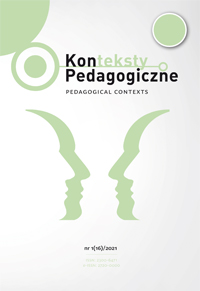Abstract
There is a dearth of research on parenting performed by people with intellectual disabilities focused on fathers. This report presents the results of a study aimed at understanding the perception of fathers with intellectual disabilities from the perspective of their female partners. The research was embedded in an interpretative paradigm, thus interpretive phenomenological analysis was used. Seven women, whose partners and fathers of their children were men diagnosed with intellectual disability, took part in semi-structured interviews. In the process of the analysis, three overarching themes were identified: (1) intellectual disability of partners, (2) barriers to a successful relationship and fatherhood, and (3) factors contributing to success in the relationship and fulfillment by partners as fathers.
References
Ahlund, I. (2010). Our Fathers. On Fathers with Intellectual Disabilities, http://disability-studies.leeds.ac.uk/files/library/Ahlund-Our-Father.pdf [dostęp: 15.07.2016].
Ashworth, P. i Lucas, U. (1998). What is the ‘World’ of Phenomenography? Scandinavian Journal of Educational Research, 42(4), 415-432. DOI: 10.1080/0031383980420407.
Booth, T. i Booth, W. (2002). Men in the Lives of Mothers with Intellectual Disabilities. Journal of Applied Research in Intellectual Disabilities, 15, 187–199.
Ćwirynkało, K. (2019). Ryzyko zaniedbania dziecka a niepełnosprawność intelektualna rodzica. Dziecko Krzywdzone. Teoria, badania, praktyka, 18(1), 69–82.
Emerson, E., Llewellyn, G., Hatton, C., Hindmarsh, G., Robertson, J., Man, W.Y.N. i Baines, S. (2015). The Health of Parents with and without Intellectual Impairment in the UK. Journal of Intellectual Disability Research, 59, 1142–1154. DOI: 10.1111/jir.12218.
Espe-Sherwindt, M. i Crable, S. (1993). Parents with Mental Retardation: Moving beyond the Myths. Topics in Early Childhood Special Education, 13(2), 154–174. DOI: 10.1177/027112149301300205.
Evans, D.S., McGuire, B.E., Healy, E. i Carley, S.N. (2009). Sexuality and Personal Relationships for People with an Intellectual Disability. Part II: Staff and Family Carer Perspective. Journal of Intellectual Disability Research, 53, 913–921. DOI: 10.1111/j.1365-2788.2009.01202.x.
Freedman, R.I. (2001). Ethical Challenges in the Conduct of Research Involving Persons With Mental Retardation. Mental Retardation, 39(2), 130–141. DOI: 10.1352/0047-6765(2001)039<0130:ECITCO>2.0.CO.
Giorgi, A. (2010). Phenomenology and the Practice of Science. Existential Analysis, 21(1), 3–22.
Hsieh, H.-F. i Shannon, S.F. (2005). Three Approaches to Qualitative Content Analysis. Qualitative Health Research, 15, 1277–1288. DOI: 10.1177/1049732305276687.
Husserl, E. (1989). Nastawienie nauk przyrodniczych i humanistycznych. Naturalizm, dualizm i psychologia psychofizyczna. W: Z. Krasnodębski (red.), Fenomenologia i socjologia (s. 53–74). Warszawa: PWN.
Kijak, R. (2019). Rodzice z niepełnosprawnością intelektualną. Warszawa: PWN.
Lizoń-Szłapowska, D. (2011). Functioning in Motherly and Fatherly Roles of Disabled People. W: B. Ostapiuk, K. Żółkowska i T. Żółkowska (red.), Facets of the Disability (s. 219–240). Szczecin: Uniwersytet Szczeciński.
Mayes, R. i Sigurjónsdóttir, H.B. (2010). Becoming a Mother – Becoming a Father. W: G. Llewellyn, R. Traustadóttir, D. McConnell, H.B. Sigurjónsdóttir (red.), Parents with Intellectual Disabilities. Past, Present and Futures (s. 17–31). Oxford: John Wiley & Sons.
Neubauer, B.E., Witkop, C.T. i Varpio, L. (2019). How Phenomenology Can Help Learn from the Experiences of Others. Perspectives on Medical Education, 8(2), 90–97. DOI: 10.1007/s40037-019-0509-2.
Parahoo, K. (2014). Nursing Research, Principles Process and Issues (3rd ed.). Hampshire: Palgrave MacMillan.
Pietkiewicz, I. i Smith, J.A. (2012). Praktyczny przewodnik interpretacyjnej analizy fenomenologicznej w badaniach jakościowych w psychologii. Czasopismo Psychologiczne, 18(2), 361–369.
Rapley, T. (2010). Analiza konwersacji dyskursu i dokumentów, tłum. A. Gąsior-Niemiec. Warszawa: PWN.
Slayter, E.M. i Jensen, J. (2019). Parents with Intellectual Disabilities in the Child Protection System. Children and Youth Services Review, 98, 297–304. DOI: 10.1016/ j.childyouth.2019.01.013.
Strike, R. i McConnell, D. (2002). Look at Me, Listen to Me, I Have Something Important to Say. Sexuality & Disability, 20(1), 53–63. DOI: 10.1023/A:1015234404530.
Sztompka, P. (2012). Socjologia. Analiza społeczeństwa. Kraków: Znak.
Tarleton, B. i Puckering, C. (2017). Mellow Futures: An Adapted Perinatal Programme for Parents with Learning Difficulties and Disabilities. International Journal of Birth & Parent Education, 4(3), 29–32.
Wołowicz-Ruszkowska, A. i Zima-Parjaszewska, M. (2015). Nowoczesne formy wspierania osób z niepełnosprawnością intelektualną. W: M. Zima-Parjaszewska (red.), Osoba z niepełnosprawnością intelektualną w postępowaniach sądowych i przed innymi organami. Poradnik praktyczny (s. 49–64). Warszawa: Polskie Stowarzyszenie na Rzecz Osób z Upośledzeniem Umysłowym.
Żółkowska, T. (2016). The ‘Undisclosed’ Subject of Normalization. The New Educational Review, 4, 211–220. DOI: 10.15804/tner.2016.46.4.18.
In accordance with the recommendation of the Ministry of Science and Higher Education, which aims to counteract the practice of “ghostwriting” and “guest authorship,” all authors submitting their text for publication should attach an author’s statement which declares the contribution of each of the authors to the article. The printed and signed statement should be delivered by mail or other means to editor-in-chief Joanna Skibska or sent in the form of a scan to the following e-mail address: redakcja@kontekstypedagogczne.pl. The authors will not receive remuneration for publishing their papers. The editors reserve the right to make minor editorial changes to the articles which will not affect the substance of the article. We encourage all authors to prepare their articles in accordance with the guidelines for manuscript preparation. Download pdf file.
Authors transfer all copyrights and grant the journal the right of first publication with the work simultaneously licensed under a Creative Commons Attribution License that allows others to share the work with acknowledgement of the work's authorship and initial publication in this journal. All authors agree to the publishing of their email addresses, affiliations and short bio statements with their articles during the submission process.

